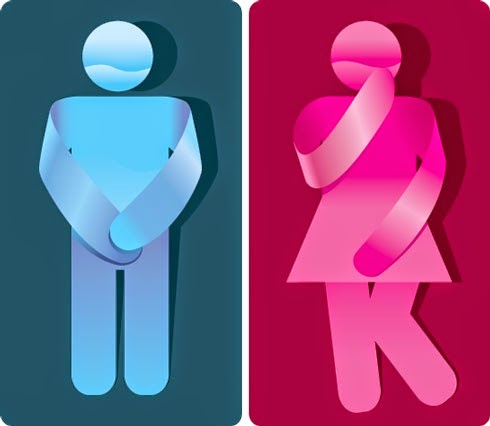Creating Awareness: Pelvic Floor Dysfunction is no Laughing Matter! Six Top Questions on PFD
Aside from urinary incontinence, it seems that pelvic
floor disorders don’t get much attention like other health conditions such as
cancer, stroke, heart disease, Alzheimer’s or Parkinson’s – to name a few. But according to the American Urogynecologic
Society, one in three women suffers from pelvic floor dysfunction, a range of
symptoms which include bladder and bowel problems as well as pelvic pain. That means one of every three of us sadly pee
when we laugh.
Bottom line is women and men with pelvic disorders
may suffer life-altering issues. Considering
that one in three women will have “leakage” problems and be embarrassed when
laughing too hard or coughing, many just avoid uncomfortable situations altogether -- anywhere from Depends and pads or reclusion
from social events because of self-consciousness, to altering daily activities
that may cause a whole new realm of physical and emotional conditions.
So what is Pelvic Floor Disorder? Why does it happen? How does it get treated? How
can it be prevented? A summary of several sources can help answer the
common questions of PFD.
Understanding the
importance of the pelvic floor muscles
The pelvic floor helps support the internal
organs and aids with the function of urination and defecation. Pelvic floor muscles form the base of the group of
muscles commonly called the ‘core’. These muscles work with the deep abdominal and
back muscles and the diaphragm to support the spine and control the pressure
inside the abdomen. The pelvic floor muscles play an important role in bladder
and bowel control, supporting the pelvic organs and sexual function in both men
and women. The weakness in these set of
muscles is what creates Pelvic Floor Dysfunction.
The common causes of Pelvic Floor Dysfunction
include:
- Childbirth
- Menopause
- Constipation and straining
- Being overweight
- Chronic cough
- Heavy lifting
- Poor posture
Who typically suffers
from Pelvic Floor Dysfunction?
- Pregnant women
- Women who have recently, or ever, had a baby
- Women who are going through, or have gone through, menopause
- Women who have undergone gynaecological surgery, such as a hysterectomy
- Men who have undergone surgery for prostate cancer.
What are the most common symptoms of Pelvic Floor
Disorders?
- Accidentally leaking urine when you exercise, laugh, cough or sneeze
- Needing to get to the toilet in a hurry or not making it there in time
- The need to frequently go to the toilet
- Finding it difficult to empty your bladder or bowel
- Accidental loss of feces or wind
- A prolapse
- in women, this may be felt as bulging into the vagina, heaviness or discomfort, or a feeling of pulling, dragging or dropping down
- In men, this may be noticed as a bulging coming out of the rectum, a feeling of
- Needing to use your bowels but not needing to go
- Pelvic pain
- Pain during sexual intercourse, and
- Poor sensation or loss of bladder control during sexual intercourse.
What prevents women from getting treatment?
- Resignation – Accepting it as part of life: “After having 5 kids…” or “I am just getting old”
- Embarrassment – Centering life around one’s bladder and avoiding activities that one enjoys because of incontinence issues.
- Lack of awareness - Pelvic Floor Dysfunction can start at a younger age and is not only related with aging. Now many women who are having children are informed on the possibilities of PFD down the road.
What is the treatment for Pelvic Floor Disorders?
Currently, there is much discussion on the adequate
treatment for a Pelvic Floor Disorder, considering that patients might not
respond well to any given treatment.
Although current research shows that a
comprehensive, non-surgical treatment might improve the conditions related to
Pelvic Floor Disorders, specialists may generally recommend the most common
forms of treatment:
- A change in lifestyle
- Relaxation Techniques Dietary Change
- Exercising
- Physical Therapy
- Medication
- Surgery
As with any type of condition, please refer to your
physician if you suspect you have any symptoms related to Pelvic Floor Disorder.
Sources:
NIH Eunice Kennedy Shriver National Institute of
Child Health and Human Development
University of Missouri-Columbia through Science
Daily
American
Urogynecologic Society
ABC News: New Explanation for Women’s Pelvic Pain?
Cleveland Clinic
International
Foundation for Functional Gastrointestinal Disorders




Comments
Post a Comment